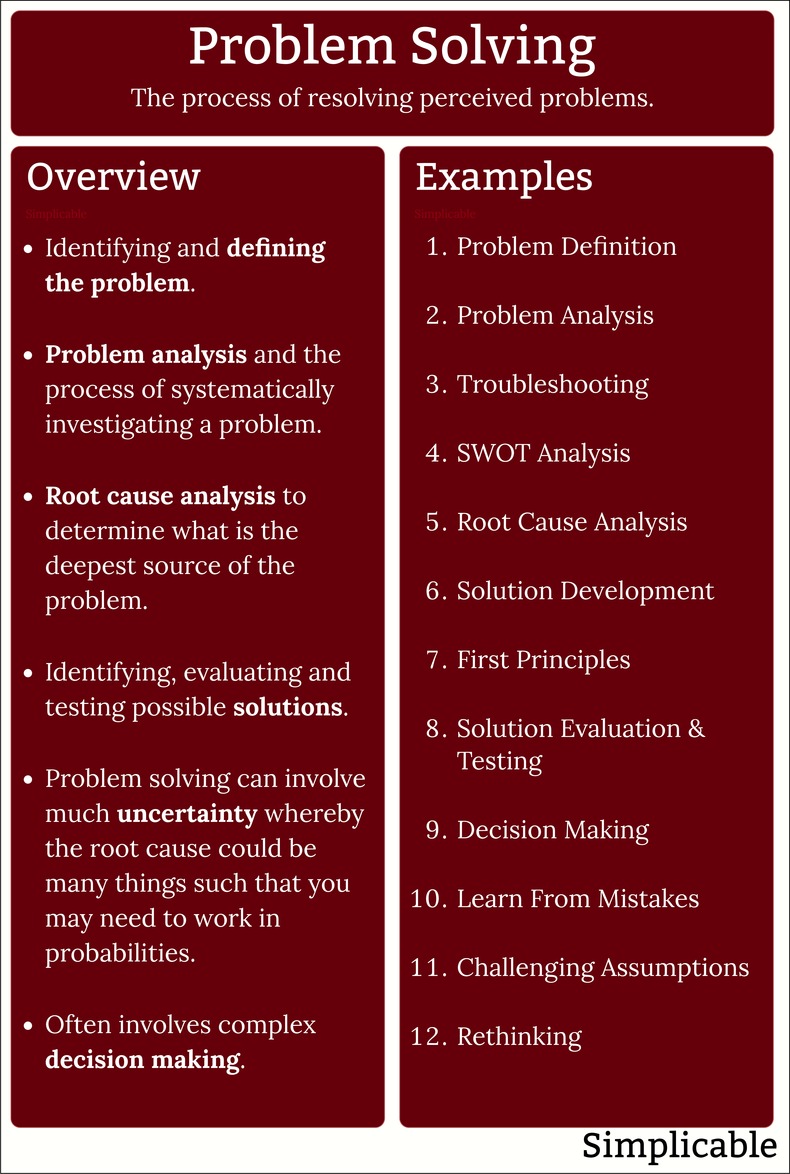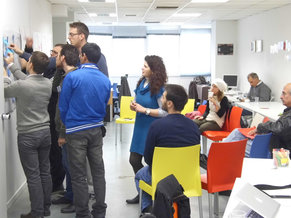
A business unit builds new revenue after losing a major customer. | A carpenter fixes a flaw in a wall without having to tear it down and reconstruct it. |
A hotel manager handles a customer complaint to the customer's satisfaction. | A hotel that manages to feed guests after a disaster disrupts transportation and supplies. |
A manager finds a way to deliver a project after three resources are sick for an extended period of time in the last month of the project. | A manager who handles criticism directed at their team from executives. |
A manager who is able to push a team to improve their work. | A parent convinces their child to do their homework. |
A pilot lands an aircraft in a strong crosswind. | A restaurant manager finds a supply of ingredients when a shipment is late. |
A sailor navigates through high wind and waves. | A software develop identifies and fixes a bug that was crashing a system. |
A traveler finds a way home when they miss their flight. | A user figures out how to turn off a software feature was interfering with their productivity. |
Adapting a product to changing customer needs. | Adapting to cost increases by finding substitutes. |
Adapting to price competition to recover lost revenue. | Adapting to shortages and late shipments. |
Adapting to technological change that threatens your business model. | Addressing a safety issue on a construction site. |
An athlete who comes back from an injury. | Building support for an idea. |
Catching up to a competitor who launches an innovative product. | Changing a business process to handle new products. |
Clearing issues to move a project forward. | Closing a sales deal after a customer appears to disengage in favor of a competitor. |
Convincing a secretive and isolated team in your company to cooperate. | Convincing a talented employee not to quit. |
Correcting a mistake at work. | Delivering a project on time that was running late. |
Designing an approval process to reduce invalid expenses. | Developing a new product to recover from declining sales. |
Diversifying a business to reduce risk to revenue. | Finding and addressing the cause of product defects on a production line. |
Finding friends and social things to do in a new city and job. | Fixing low quality data that was causing billing errors. |
Gaining approval for a project budget after an initial rejection. | Handling bad publicity. |
Handling harsh criticism of your work in a positive way. | Identifying and correcting an inaccuracy in your accounting. |
Increasing the performance of a team. | Increasing the productivity of a team member who has been slacking. |
Keeping a business going when a system goes down. | Looking through research data to find value in a failed experiment. |
Managing a high workload of homework and studying. | Managing commitments to a manager who tries to assign you impossible missions and low value work. |
Managing the low performance of a team member. | Overcoming a disadvantage such as poverty. |
Overcoming a fear of public speaking. | Overcoming communication issues such as unstated assumptions. |
Overcoming setbacks such as a researcher who finds an experiment doesn't produce promising results. | Passing an exam after missing many lectures. |
Patching a cybersecurity vulnerability. | Paying off a burdensome debt. |
Prioritizing to deliver high value work when overloaded with requests. | Recovering in your academic year after being out sick for a few weeks. |
Recovering your grades in a class you're failing. | Reducing absenteeism on your team. |
Reducing software licensing costs. | Reducing spending to save money for retirement. |
Refinancing a small business to remain liquid. | Reinventing a design when a client rejects your initial proposals. |
Replacing a partner who is underperforming. | Replacing an unreliable technology or machine. |
Resolving a mechanical problem with a machine. | Resolving a technical problem that causes a service outage. |
Resolving an issue with an upset neighbor. | Resolving inconsistencies in the requirements of different stakeholders. |
Reversing an incorrect charge on your customer's account. | Simplifying the design of software that is needlessly complex and expensive to maintain. |
Troubleshooting network issues to restore internet connectivity. | Working to improve the negative culture of a team. |
Overview
Problem solving is the process of identifying a problem, determining its root cause and developing and testing solutions. This is can be an extremely complex pursuit surrounded in uncertainty, constraints and risk.


































